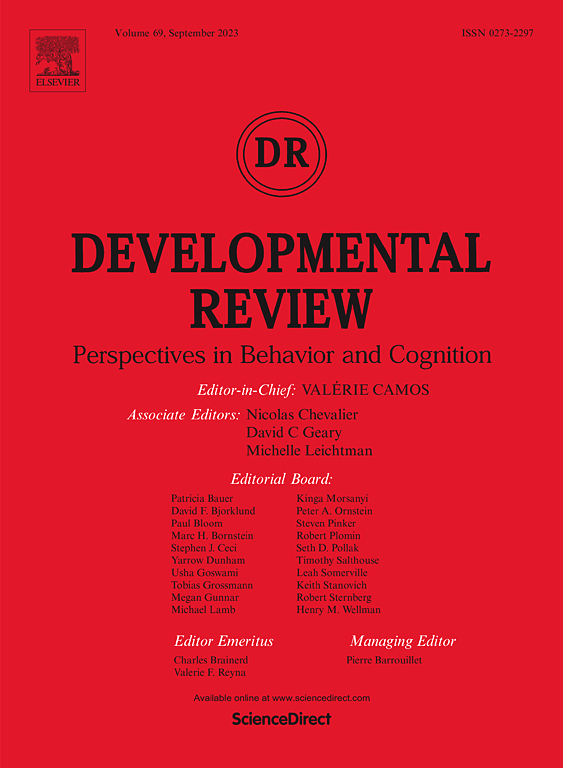改善幼儿期执行功能:父母主导干预的系统回顾和荟萃分析
IF 5.6
1区 心理学
Q1 PSYCHOLOGY, DEVELOPMENTAL
引用次数: 0
摘要
执行功能的个体差异在生命的第一年就可以检测到,并在整个学前阶段继续发展。心理科学表明,执行功能是可塑的,父母作为变化的潜在推动者发挥着至关重要的作用。然而,旨在教导父母如何在学龄前提高孩子的执行功能的干预措施的有效性仍不清楚。为了解决这一差距,我们对父母/照顾者主导的干预措施的文献进行了系统回顾和荟萃分析,旨在培养2至5岁 儿童的执行功能。我们在12个数据库中进行了广泛的搜索,涵盖了发展心理学、教育和政策等学科。在筛选了11,000多篇论文后,有12项研究符合我们的纳入标准。这些干预措施包括家访,父母/照顾者的面对面小组会议,或两者结合。我们的荟萃分析包括8项研究,共有1815名参与者——治疗组946名,对照组869名——结果显示,治疗组和对照组之间总体上没有统计学上的显著差异。对两项使用相同结果测量方法的研究进行随访分析,结果显示有统计学意义的小到中度的积极效果[SMD = 0.28, 95 % CI(0.08, 0.47)]。我们为改进这一领域的证据基础提出了建议,强调在未来的研究中需要更严格和标准化的方法。这篇综述强调了父母作为儿童执行功能发展的关键促进者的潜力,并强调了未来干预的有希望的方向。本文章由计算机程序翻译,如有差异,请以英文原文为准。
Improving executive function during toddlerhood: A systematic review and meta-analysis of parent-led interventions
Individual differences in executive functions are detectable in the first year of life and continue to develop throughout the preschool years. Psychological science suggests that executive function is malleable, with parents playing a crucial role as potential agents of change. However, the effectiveness of interventions aimed at teaching parents how to enhance their children’s executive function during the preschool years remains unclear. To address this gap, we pre-registered a systematic review and meta-analysis of the literature on parent/caregiver-led interventions designed to foster children’s executive function from ages 2 to 5 years. We conducted an extensive search across 12 databases spanning disciplines such as developmental psychology, education, and policy. After screening over 11,000 papers, 12 studies met our inclusion criteria. These interventions included home visits, in-person group sessions for parents/caregivers, or a combination of both. Our meta-analysis, which included 8 studies with a total of 1,815 participants − 946 in the treatment group and 869 in the control group − revealed no statistically significant difference between the treatment and control groups overall. A follow-up analysis of two studies using the same outcome measure for Effortful Control showed a small to moderate positive effect that was statistically significant [SMD = 0.28, 95 % CI (0.08, 0.47)]. We provide recommendations for improving the evidence base in this area, emphasising the need for more rigorous and standardised methodologies in future research. This review underscores the potential of parents as key facilitators in the development of their children’s executive functions and highlights promising directions for future interventions.
求助全文
通过发布文献求助,成功后即可免费获取论文全文。
去求助
来源期刊

Developmental Review
PSYCHOLOGY, DEVELOPMENTAL-
CiteScore
11.00
自引率
3.00%
发文量
27
审稿时长
51 days
期刊介绍:
Presenting research that bears on important conceptual issues in developmental psychology, Developmental Review: Perspectives in Behavior and Cognition provides child and developmental, child clinical, and educational psychologists with authoritative articles that reflect current thinking and cover significant scientific developments. The journal emphasizes human developmental processes and gives particular attention to issues relevant to child developmental psychology. The research concerns issues with important implications for the fields of pediatrics, psychiatry, and education, and increases the understanding of socialization processes.
 求助内容:
求助内容: 应助结果提醒方式:
应助结果提醒方式:


